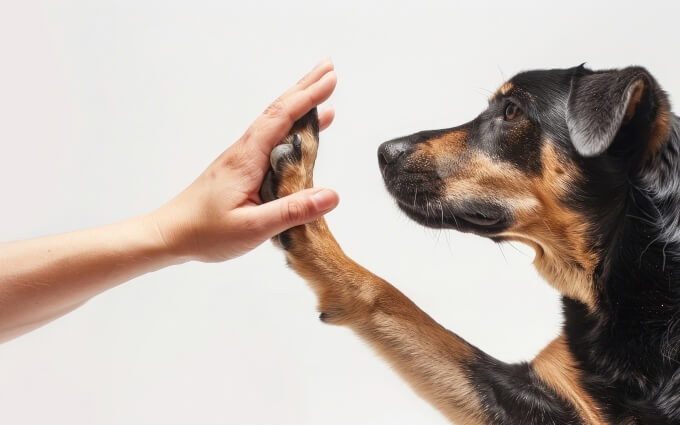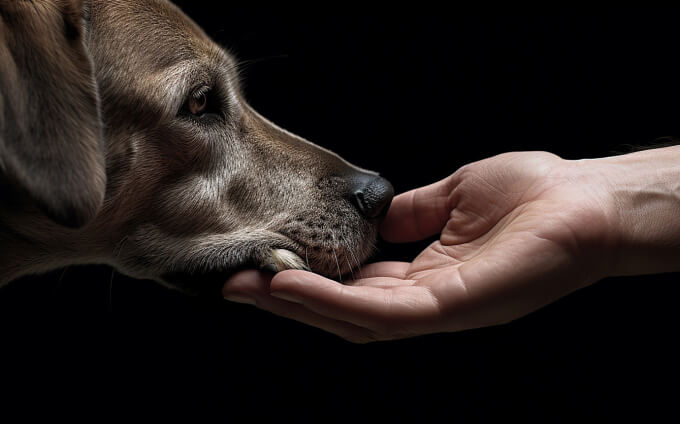- Home
- Dog Behavior
- Why Your Dog Ignores You and How to Change It
Why Your Dog Ignores You and How to Change It
Is your dog ignoring you? Explore the reasons behind this behavior and actionable steps to bring back the focus, from training techniques to environmental adjustments.

- 39

Why Does Your Dog Ignore You?
We've all been there: you call your dog, and they look at you like you've suddenly become invisible. It's frustrating, and maybe even a bit heartbreaking. But here's the thing - your dog isn't being malicious. More often than not, dogs ignore their humans because of a combination of factors like confusion, distractions, or even a lack of motivation.
Let's break down some possible reasons why your dog is pulling the ‘silent treatment': from distractions at the park to inconsistent training, there are multiple factors to consider.
- Distractions:Dogs, like us, can get overwhelmed by their environment. Noisy parks or new scents can make focusing on you seem much less interesting.
- Lack of Motivation:If your rewards (i.e., treats) don't cut it, your dog might think, 'Why bother?'
- Confusion:If commands aren't clear or consistent, your dog may not know what you want them to do.
Mastering Your Commands: Be Clear, Consistent, and Fun
Let's face it: no one likes a boss who changes the rules every day. Dogs are the same! If you're throwing out mixed signals, your dog will tune you out. Use short, clear commands and always stick to the same words. For example, don't alternate between ‘Come here' and ‘Here, boy!' - consistency is key.
And hey, make it fun! Positive reinforcement works wonders, so have treats or a favorite toy ready to celebrate when they get it right. If the treat doesn't excite them, find one that does. Remember, not all rewards are created equal in a dog's eyes - your high-value snack may be their version of ‘meh'.
Is Your Dog Bored? Time for Mental and Physical Stimulation
Sometimes, a dog's disinterest is a sign of boredom. A bored dog is likely to ignore you because, frankly, you've become as exciting as a rerun of a show they've seen 100 times. Mix things up by adding mental stimulation to their day - puzzle toys, games, or even some new tricks can work wonders.
- Introduce games like hide-and-seek with treats to engage their mind.
- Go beyond basic training: teach complex commands like 'stay' with distractions, and reward them with praise and their favorite treat.
Physical exercise is just as crucial. A tired dog is more likely to listen because they've burned off excess energy. Go for walks, engage in agility training, or simply toss around a ball in the yard.
Don't Forget the Environment: Keep It Distraction-Free
Imagine trying to focus on a work call in the middle of a crowded café. Sounds tough, right? Now, think about your dog trying to listen to your commands while other dogs are running around or someone's grilling burgers nearby. Dogs can get easily distracted by their surroundings, so when you're working on recall or other obedience tasks, choose calm, quiet environments. Start at home or in a distraction-free zone before heading to the dog park for the ultimate test.
When to Seek Professional Help
If your dog's ignoring has escalated to the point of avoidance, or they're showing signs of anxiety or stress, it might be time to get some expert help. A professional trainer or behaviorist can help identify the root cause and offer tailored solutions. Some behavior, like fear or anxiety, may require special attention, and it's always better to tackle these issues early on before they become ingrained.
- If your dog is avoiding eye contact or hides when you enter a room, these could be signs of deeper issues like anxiety.
- Consult a vet if your dog's behavior changes suddenly - it could be linked to health issues like ear infections or arthritis.
Frequently Asked Questions about dogs ignoring their owners
Why does my dog ignore me?
Dogs may ignore their owners due to distractions, lack of training, or because they don't see the command as rewarding to follow.
How can I get my dog to listen to me?
Use consistent commands, positive reinforcement, and practice in distraction-free environments before adding challenges.
Is my dog being stubborn when it ignores me?
Most often, it's not stubbornness but confusion, lack of motivation, or competing distractions in the environment.
What should I do if my dog won't come when called?
Practice recall with high-value rewards and gradually increase the level of distraction as your dog improves.
Can older dogs learn to stop ignoring commands?
Yes, with patience and consistent training, dogs of any age can improve responsiveness to their owner's cues.
In Conclusion: Building a Stronger Bond
Regaining your dog's attention is more than just about training - it's about understanding what makes your dog tick. Take the time to assess their needs, provide mental and physical stimulation, and ensure that you're communicating in a way they understand. With patience and consistency, you'll not only get their attention back, but you'll also strengthen your bond.
And remember, training doesn't have to be a chore. The more fun and engaging you make it for both of you, the better your relationship will be!
- 39
 Marcin Solgaard
Marcin Solgaard
Marcin is a true dog enthusiast! He is always seen with his 9-year-old boxer by his side. Marcin believes that dogs thrive on love, fun and positive experiences. On their daily adventures, people often stop Marcin to ask how his boxer is so happy and well-behaved. He happily shares tips on dog behavior and fun activities to create a happy and harmonious life with your dog.
-
Dog Behavior
 Does My Dog Know I Care About It?
Does My Dog Know I Care About It?Discover the ways your dog shows it knows you care and how you can reinforce that loving bond through simple actions and daily interactions.
 Cassandra DalgaardAug 05, 202444
Cassandra DalgaardAug 05, 202444 -
Food & Nutrition
 The Best Foods to Boost Your Dog's Immune System
The Best Foods to Boost Your Dog's Immune SystemTo keep your dog healthy and resilient, fueling their immune system with the right foods is key. In this post, we'll cover the top nutrient-packed foods that can give your dog's immune system the support it needs, helping them fend off illness and stay energetic.
 Marcin SolgaardOct 04, 20249
Marcin SolgaardOct 04, 20249 -
Dog health
 Which Emotions Do Dogs Actually Experience? Understanding Your Dog's Emotions
Which Emotions Do Dogs Actually Experience? Understanding Your Dog's EmotionsDogs experience a variety of basic emotions similar to those of a young child. Learn about the emotions your dog truly feels, how they express them, and what it means for your relationship.
 Cassandra DalgaardJul 30, 202478
Cassandra DalgaardJul 30, 202478 -
Tips & Tricks
 How to Train Your Dog to Walk Off-Leash
How to Train Your Dog to Walk Off-LeashThis guide will walk you through everything you need to know, from essential commands to mastering off-leash walks even in distracting environments
 Marcin SolgaardJul 02, 202451
Marcin SolgaardJul 02, 202451 -
Tips & Tricks
 How to Train Your Dog to Give Paw
How to Train Your Dog to Give PawTeaching your dog to give paw is a fun and rewarding experience that strengthens your bond. This guide walks you through the process with tips, tricks, and plenty of paw-sitive reinforcement.
 Marcin SolgaardApr 11, 202441
Marcin SolgaardApr 11, 202441 -
Tips & Tricks
 How to Teach Your Dog to Come When Called
How to Teach Your Dog to Come When CalledThis guide walks you through the process, from selecting the right command to dealing with distractions, ensuring a strong recall every time.
 Marcin SolgaardJul 10, 202448
Marcin SolgaardJul 10, 202448 -
Dog Behavior
 Why Does My Dog Put Its Head on Me? Understanding the Behavior
Why Does My Dog Put Its Head on Me? Understanding the BehaviorEver wondered why your dog puts its head on you? This guide dives into the reasons behind this endearing behavior, from seeking comfort to showing love.
 Michelle TorringAug 03, 202428
Michelle TorringAug 03, 202428 -
Food & Nutrition
 How to Choose the Right Diet for Your Allergic Dog
How to Choose the Right Diet for Your Allergic DogFind out how to select the perfect diet for your dog with allergies. Learn about elimination diets, hypoallergenic foods, and the best ingredients to keep your furry friend healthy and happy.
 Marcin SolgaardJun 09, 202427
Marcin SolgaardJun 09, 202427 -
Tips & Tricks
 Are You Ready for Life with a Dog? Everything You Need to Know
Are You Ready for Life with a Dog? Everything You Need to KnowThis guide helps you determine if you're ready for a dog by exploring the responsibilities, financial requirements, and lifestyle changes necessary for successful dog ownership.
 Marcin SolgaardJul 31, 202433
Marcin SolgaardJul 31, 202433 -
Puppies & Young dogs
 How to Puppy-Proof Your Home: A Complete Guide
How to Puppy-Proof Your Home: A Complete GuideBringing a new puppy home is thrilling, but keeping them safe means some serious puppy-proofing. This guide covers everything from securing hazardous items to creating a puppy-friendly zone, making your home a safe haven for your curious new companion.
 Michelle TorringOct 10, 202412
Michelle TorringOct 10, 202412










